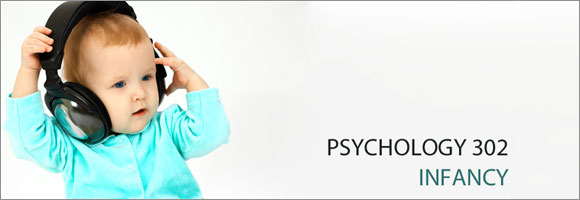
Calendar Description
From birth to 3 years of age, human infants undergo an astounding transformation, learning complex motor skills and behaviors, developing sophisticated cognitive abilities, acquiring language and learning to interact with other people. Understanding this developmental trajectory and the mechanisms underlying it allows us to take better care of our children and provides us with a window into human nature. This course will offer you the theoretical and empirical knowledge necessary to understand and critically evaluate scientific and everyday claims, ideas and observations about infancy.
Student or audience description
Psychology 302 is an upper-division undergraduate course offered for degree credit within the Faculty of Arts. Because the course focuses on the role of psychological, physical and social development in infancy, it should be of interest to students wishing to learn about the trajectory of development in humans and the mechanisms underlying it, as well as to those wanting to learn more about human nature more generally. Students enrolled in other developmental psychology courses and subjects in humanities or social sciences, such as family studies and social work, will find psychology 302 complementary. This course should be of interest to those with career pursuits in psychology, education, health and medicine, and law and public policy.
Prerequisites and/or Course Restrictions: Enrollment in this course is restricted to students in 3rd year or above. You must have taken either (a) PSYC100 or (b) all of PSYC101, PSYC102 (or (c) six credits of 200-level Psychology (but not 205 or 263).
Objectives for the course
Psychology 302 is designed to help students combine theoretical, methodological, and practical inquiry to understand infant development and human nature. More specifically, we will cover such topics as physical development (e.g., motor development, brain development), early perception and cognition, social and emotional needs and development, early language acquisition and other forms of communication (e.g., nonverbal language), and how these components interact from before birth until around age three.
After completing the course, students should be able to:
- Discuss the history of developmental psychology and the theoretical approaches in this field
- Understand the methodological issues involved in conducting psychological research on infant development
- Identify the roles of nature and nurture and the multiple ways they interact in human’s early development
- Describe the physical, psychological, and social changes in infants from before birth to age three
- Recognize the developmental mechanisms and conceptual issues underlying these changes
- Apply their knowledge acquired in this course to real life issues (e.g., parenting, education, public policy)
Textbook
Bundled Pkg containing: Gross, Dana. Infancy: Development from Birth to Age 3. 1st ed. , Allyn & Bacon 2007, MyDevelopmentKit for Infancy, and MyVirtualChild Student Access Code Card, 2nd ed. ISBN: 9780138018153.
This textbook is one of the Psychology Department approved textbooks for Psyc 302 and is often used by instructors teaching the on-campus version of this course. It receives high ratings from students and is widely used in other Infancy courses across North America.
Supplementary Readings
An important part of this course is to expose students to the scientific method underlying infancy research via empirical journal articles and other scholarly writings. As such, students will be assigned a few scientific readings to supplement their textbook readings. These supplementary readings will also provide students with a more in-depth look at specific ‘hot’ topics in infancy, giving students both breadth and depth exposure to key topics in the study of infancy.
